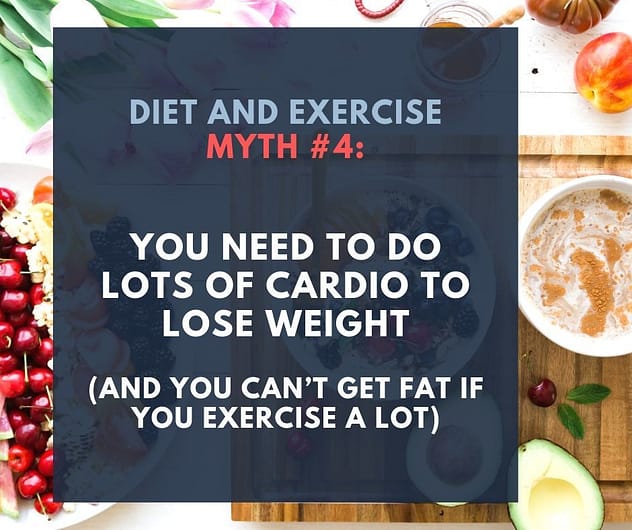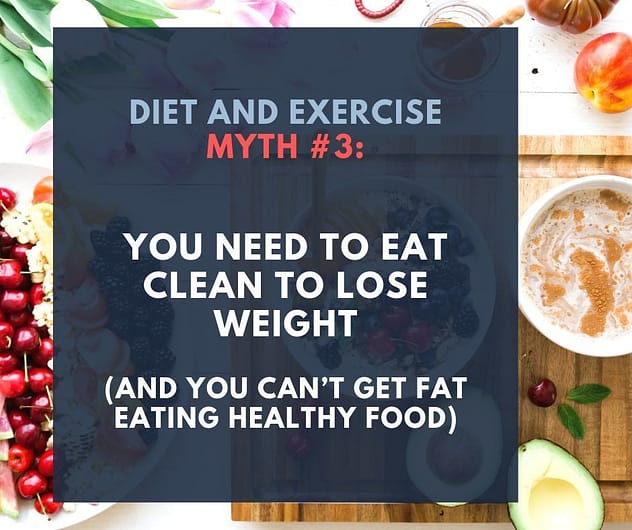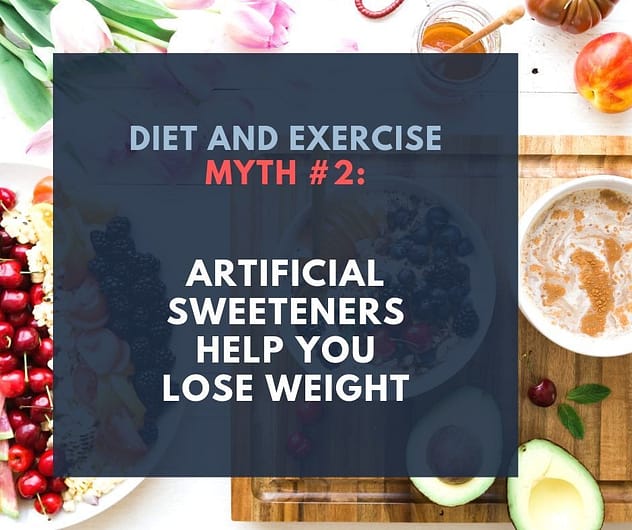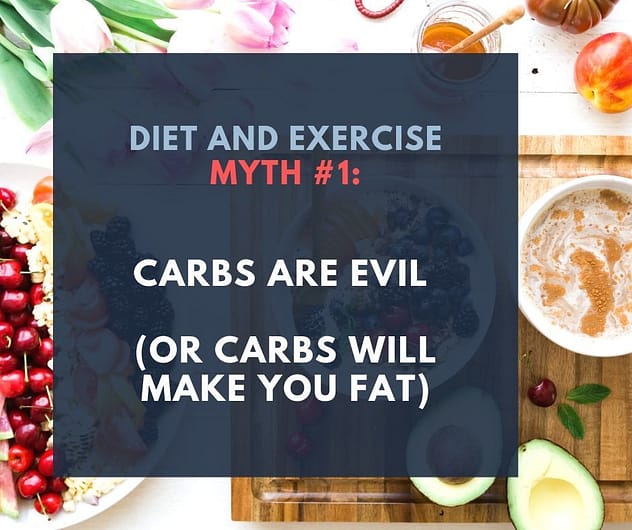Archive
Monthly Archives: June 2019
Monthly Archives: June 2019


This myth is closely related to Myth #3, which was around the idea that the quantity of the food you eat is much more important for weight loss than the quality of the food.
But this myth is more about the fact that there are two sides to the energy balance equation. And even if you’re burning a lot of calories by doing exercise, it is still surprisingly easy to eat more calories than you’re burning, and negate the exercise altogether.
This is particularly true when you consider that the ‘energy in’ side of the equation is easier to manipulate than the ‘energy out’ side. That is, you get more bang for your buck by controlling the number of calories that you eat than you do trying to increase the number of calories you burn with movement and exercise.
You may have heard the saying that you can’t outrun a poor diet. The idea there is the same, and if you’ve ever done the translation between the number of calories that are in a confectionery bar, to the amount of exercise you’d need to do in order to burn that amount of energy, you’ll know what we’re talking about here.
So be aware that cardio is not the most effective way to lose weight, and even if you are doing lots of cardio, it’s surprisingly easy to over-compensate for that in your diet.
VitalCapacity.live exists to help ordinary people like you transform your mind, body and spirit. If you have any questions or feedback, please don’t hesitate to get in touch with me.
You can contact me here: Todd@VitalCapacity.live.
Check out my Body Transformation Blueprint digital course. It teaches ordinary people how to look good, feel great, and get the body you've always wanted.
Ciao for now,



You may have heard of the Twinkie Diet. A Human Nutrition professor at Kansas State University spent 10 weeks straight eating sugary cakes every 3 hours and not a lot else. He was out to prove that when it comes to weight loss, the nutritional value of the food doesn’t mean much and that it’s really all just about pure calories.
His diet over the 10 week period consisted of Twinkies, Hostess and Little Debbie snacks, as well as nutty bars, powdered donuts, sugary cereals, Doritos and Oreos. He also drank a protein shake every day as well as taking a daily multivitamin, and he did also include a very small amount of vegetables.
At the end of the 10 weeks on this ‘convenience store diet’, the professor had lost 27 pounds (12 kilograms).
He had carefully measured the calorie content of all the junk food he ate, and kept his total consumption to 1800 calories per day. This represented a calorie deficit of about 30% for his size, weight and activity level. That means that he was consuming about 30% fewer calories than he was burning every day.
1800 calories worth of junk food is not a physically large amount of food, because that sort of food is so calorie dense. So there’s no doubt that the professor spent a lot of his time in a state of hunger.
But the key takeaway here is that it isn’t the quality of your food that makes the biggest difference to weight loss, it’s the quantity of calories in that food (compared to the total number of calories that you burn).
VitalCapacity.live exists to help ordinary people like you transform your mind, body and spirit. If you have any questions or feedback, please don’t hesitate to get in touch with me.
You can contact me here: Todd@VitalCapacity.live.
Check out my Body Transformation Blueprint digital course. It teaches ordinary people how to look good, feel great, and get the body you've always wanted.
Ciao for now,



Artificial sweeteners were first marketed to consumers in the 1950s, and have been controversial ever since. Scientific research is now telling us that artificial sweeteners have many dangerous side effects.
They can lead to weight gain, not weight loss.
Participants in a recent heart study who drank more than 21 diet drinks per week were twice as likely to become overweight or obese as people who didn’t drink diet soda.
The journal of the Canadian Medical Association recently published a meta-analysis of high-quality trials relating to artificial sweeteners and body weight. The review found little connection to weight loss, except in a couple of long-term trials that were sponsored by the artificial sweetener industry itself.
Another review of a large number of observational studies found that people who used artificial sweeteners over time gained weight and had a larger waist circumference.
They also had higher rates of high blood pressure, metabolic syndrome, type 2 diabetes, and cardiovascular events. Researchers discovered that daily consumption of artificially sweetened drinks led to a 35% increase in the risk of metabolic syndrome and a 67% increase in the risk for type 2 diabetes.
How and why does this happen?
VitalCapacity.live exists to help ordinary people like you transform your mind, body and spirit. If you have any questions or feedback, please don’t hesitate to get in touch with me.
You can contact me here: Todd@VitalCapacity.live.
Check out my Body Transformation Blueprint digital course. It teaches ordinary people how to look good, feel great, and get the body you've always wanted.
Ciao for now,



Carbohydrate gets a bad rap these days, especially on social media and in some of the trendy diets.
But weight gain is the result of the quantity and type of carbs you eat — not the carbohydrates themselves.
It’s true that some types of carbohydrate are better for you than others, but it’s not as simple as some would have you believe and there’s no one size fits all.
Carbs aren’t evil. In fact, complex carbohydrates in whole foods are generally healthy. On the other hand, most of us would do well to eat less highly refined sugar than we do.
Fruit is awesome, so don’t shy away from the carbohydrate content that comes with fruit. The fibre you get at the same time as the fructose really smooths out the post-prandial blood glucose spike (post-prandial means "after eating"). The health benefits of fruit totally outweigh any concerns about carbs and calories.
Fresh fruit is mostly made of water and fibre, so fruit is not nearly as calorie dense as most people think. In fact, the evidence suggests that fruit actively helps you lose weight when eaten as part of a balanced diet.
It’s the simple sugars in highly processed foods, snacks, and confectionary that can be a problem. Those are highly refined, and really should be minimised or avoided altogether.
Soft drinks might be the worst offenders. If you drink soft drink, the biggest bang for your buck will be replacing it with sparkling mineral water or just plain water. Drinking your calories is one of the biggest mistakes that most people make when they’re trying to lose weight.
VitalCapacity.live exists to help ordinary people like you transform your mind, body and spirit. If you have any questions or feedback, please don’t hesitate to get in touch with me.
You can contact me here: Todd@VitalCapacity.live.
Check out my Body Transformation Blueprint digital course. It teaches ordinary people how to look good, feel great, and get the body you've always wanted.
Ciao for now,
